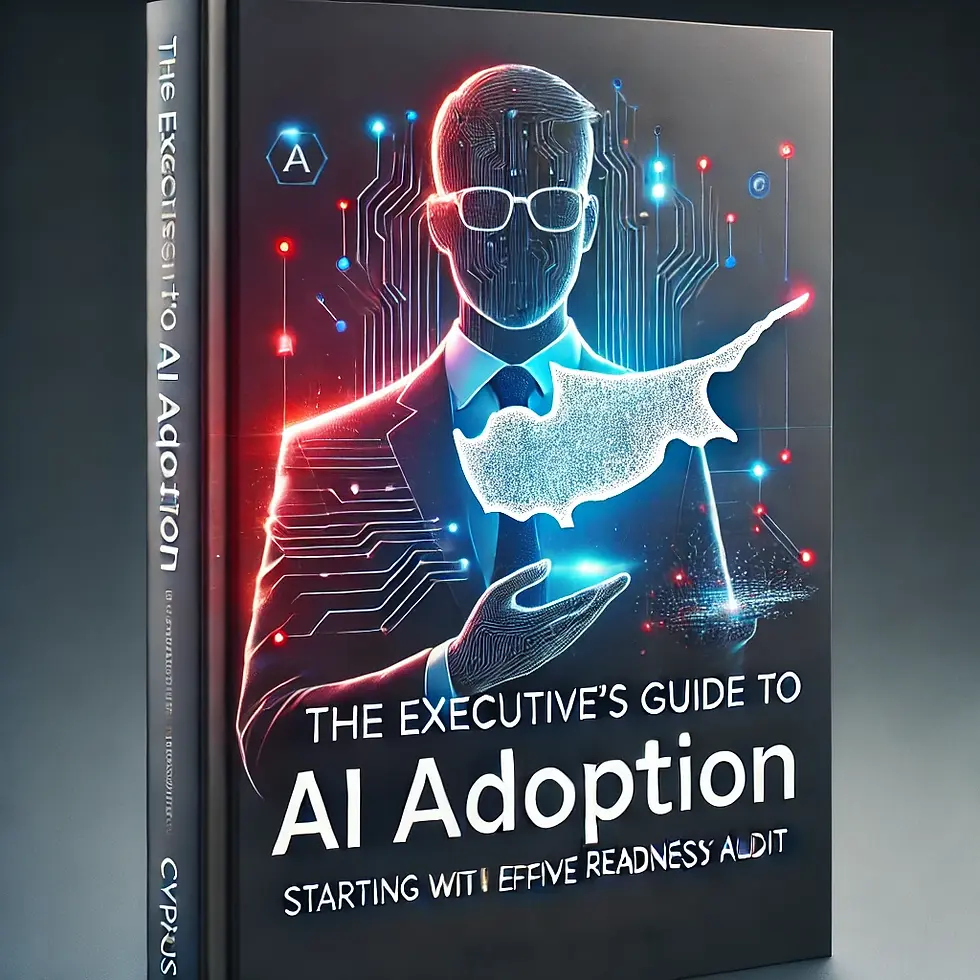Is Your Business AI-Ready? A Cyprus Compliance GuideThe Urgency of AI Compliance in Cyprus
- Sotiris AI writer

- Mar 1, 2025
- 4 min read
The European Union’s Artificial Intelligence Act (AI Act) came into force on August 1, 2024, establishing comprehensive regulations for AI development and use. As an EU member state, Cyprus is required to enforce these regulations, making AI compliance a business-critical issue.
Non-compliance isn’t just a bureaucratic hurdle—it can result in financial penalties of up to €35 million or 7% of global annual turnover, reputational damage, and legal challenges (European Commission).

A 20-hour AI Readiness Audit provides Cypriot businesses with a structured roadmap to AI compliance, ensuring they adapt smoothly to these evolving regulations.
Understanding AI Risk Categories in Cyprus
The AI Act classifies AI into four risk levels, each with different compliance obligations:
Unacceptable Risk – AI systems deemed harmful to fundamental rights (e.g., social scoring, biometric surveillance) are banned.
High Risk – AI applications in finance, healthcare, HR, law enforcement, and critical infrastructure must meet strict transparency and accountability standards.
Limited Risk – AI tools like chatbots must clearly inform users that they are interacting with AI.
Minimal Risk – AI-powered systems with low regulatory oversight, such as recommendation engines and email spam filters.
For Cypriot businesses, these risk categories are particularly relevant in:
Financial Services – AI in fraud detection and credit scoring must be transparent, unbiased, and compliant with EU financial regulations.
Healthcare & Insurance – AI-driven diagnostics and risk assessments must comply with GDPR and medical ethics regulations.
Retail & Marketing – AI profiling must respect consumer data rights and avoid discriminatory targeting.
Employment & HR – AI-assisted hiring tools must prevent algorithmic bias and ensure fairness in recruitment processes.
Does your business rely on AI in these areas? If so, ensuring compliance now will prevent costly mistakes later.
New AI Literacy Requirements: What Cypriot Businesses Need to Know
A critical component of AI compliance is AI literacy, which became a legal requirement on February 2, 2025 under the AI Act (European Commission).
What is AI Literacy?
AI literacy refers to the knowledge, skills, and awareness necessary to use AI responsibly and understand its risks and benefits.
Who Needs AI Literacy Training?
Businesses using AI – Companies deploying AI systems must train their staff to ensure responsible and compliant AI use.
Developers & providers of AI systems – Those building AI solutions must document and explain how their models work.
To support businesses, the EU AI Office has launched a living repository showcasing best practices for AI literacy (European Commission).
Failure to implement AI literacy programs could result in compliance violations, making employee training an essential part of AI adoption in Cyprus.
The AI Readiness Audit: Your Compliance Roadmap
Instead of navigating the complexities of AI regulation alone, a structured AI Readiness Audit ensures your business aligns with EU legal requirements while minimizing risk and maximizing AI potential.
What the Audit Covers:
📌 AI Risk Categorization – Identifying whether your AI applications fall under high-risk regulations.
📌 Data Governance Review – Ensuring AI meets GDPR and Cyprus privacy laws.
📌 Bias & Fairness Analysis – Testing AI models for discrimination and ethical risks.
📌 Transparency & Documentation – Ensuring AI decisions are explainable and auditable.
📌 Regulatory Action Plan – A step-by-step strategy to ensure compliance without disrupting operations.
The 20-hour audit provides businesses with clear compliance insights within a week, reducing uncertainty and helping them stay ahead of AI regulations.
Consequences of Non-Compliance
Across Europe, regulators are already enforcing AI laws, setting examples for businesses that fail to comply:
A German company was fined €64 million for using an AI-driven recruitment tool that discriminated against female applicants.
A Dutch insurance firm faced legal action for using AI-based risk assessments that unfairly penalized certain demographics.
In Cyprus, businesses must act proactively—waiting until regulatory action is taken could result in severe penalties and reputational damage.
The Competitive Advantage of AI Compliance
While AI compliance is a legal requirement, it is also a business advantage. Early compliance adopters will:
✅ Gain trust from customers and investors who prioritize responsible AI use.
✅ Avoid financial penalties that could disrupt business operations.
✅ Establish themselves as leaders in AI adoption within their industry.
Instead of viewing compliance as a burden, forward-thinking businesses see it as an opportunity to enhance operational transparency and improve AI-driven decision-making.

Take Action: Ensure AI Compliance in Cyprus Today
The AI Readiness Audit is the fastest, most effective way to:
✔ Identify regulatory risks in AI strategies before penalties arise.
✔ Align with Cyprus and EU compliance requirements.
✔ Ensure AI literacy compliance by preparing your workforce for AI adoption.
✔ Prevent costly legal and reputational issues.
🚀 Don’t wait until it’s too late—schedule your AI Readiness Audit today to ensure full compliance with the new AI Act.



Comments